If a rom-com was going to be set on a Pennsylvania farm, we think it would look a little something like this: Two passionate young folks meet working the fields of an organic farm, and it’s love at first sight. Toiling side-by-side, they forge a plan to start their own farm, and a family, too.
This is, in fact, the real-life story of Agustin and Jarrah Salazar Cernas, the founders of Chicano Sol Farm in Blain, PA, a small borough in Perry County about 40 miles west of Harrisburg. The couple did in fact start their own organic farm in 2010, after meeting as workers on a different farm.
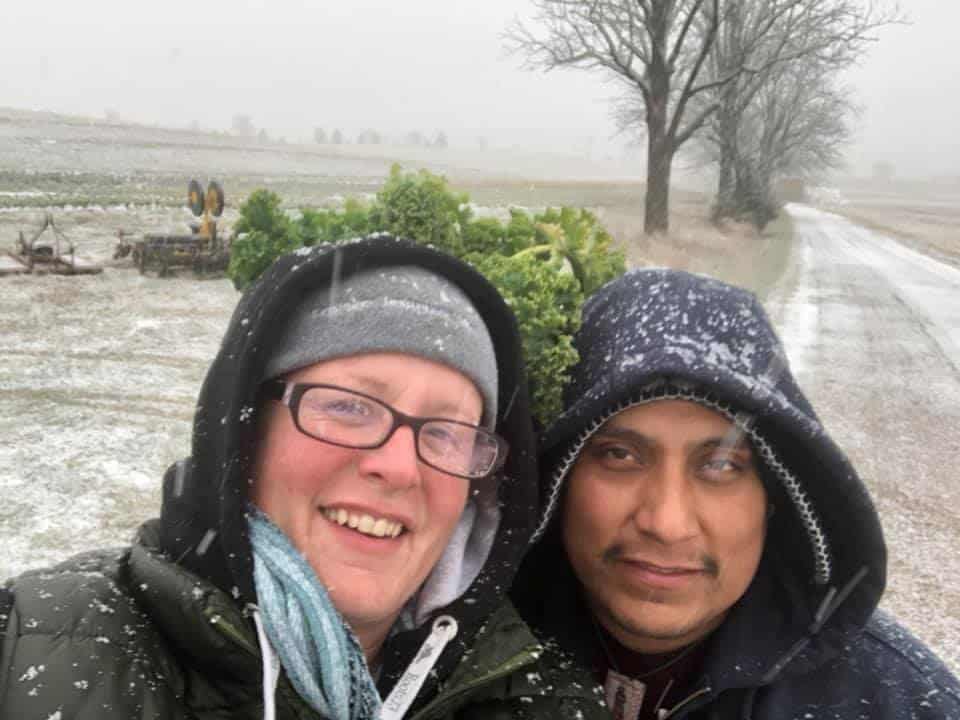
Jarrah and Agustin Salazar Cernas of Chicano Sol Farm
In the years since, they’ve had two children and expanded and evolved the farm, working diligently year after year to grow organic produce, which is available through a CSA and at weekend farmers markets in Garrett Park, Maryland, and Washington, DC. They primarily grow vegetables, including beans, tomatoes, greens, broccoli, squash, peppers, peas, potatoes and so much more!
We spoke with Jarrah Salazar Cernas for a deeper story on the background of this family-run, central Pennsylvania operation:
PA Eats: Was agriculture or farming always part of your plan?
Jarrah Salazar Cernas: I actually went off to college, and planned on going into nursing. But partway through nursing school, I hit my breaking point and didn’t return the next semester. Instead, I went back to work at Spiral Path Farm, where I had worked in high school. This is a certified organic produce farm, just down the road from my childhood house, and the owners and my parents were friends.
Agustin grew up farming on a small scale in Mexico with his dad. He did enjoy the life that farming as a child offered, enough to pursue farming upon arriving in the US, hoping to make a better life for himself and his parents. He planned to work for a time and return home. He was the youngest of 11 kids, and in Mexico, the youngest child generally inherits the parents homestead and cares for them as they age.
He landed at Spiral Path and was there when I returned. We worked together in those first days upon me returning to the farm. I was semi-fluent in Spanish, and learned quickly what I didn’t know, and the rest is history. Without sounding cliché, we were a match from the start! We both had a strong work ethic, we both cared about our positions, myself as the pack house manager, and he as the field crew leader/manager. By the time we left there, we had given a large part of ourselves and our lives to Spiral Path.
When and how did Chicano Sol really get off the ground (so to speak)?
We had purchased our home while working at Spiral Path. When we purchased the place, we really hadn’t planned on farming it, but thought a lot about what we could do with our little piece of ground while maintaining our positions at Spiral Path. We landed on pastured poultry, and though it was very small scale, it was successful. On one processing day, I became nauseated, not like I had ever felt before. Not long after we learned we were expecting our first son, Austin. Other changes seemed to be happening at Spiral Path, with new generations stepping in and things changing. Leading up to welcoming our first son, I knew I wasn’t going to be able to keep up my previous work life. But I still was looking for some sort of meaning outside of motherhood, to feel like I was doing something to help contribute financially to our family.
We found a farm that had recently gone out of business that had nine greenhouses for sale. We were back and forth over which house we wanted because I planned to raise greenhouse tomatoes. Looking back, my business plan may not have been the best, but I wanted to be able to share our love for the soil with our children. Agustin supported it and I decided to go for it. We ended up buying all nine greenhouses and didn’t look back for a second. Agustin finished the season out at Spiral Path and in the meantime, I assembled a crew, and moved all of the equipment that was part of that purchase. In the evenings, Agustin worked with us reconstructing the houses. We started with five houses, seeding the first beds on New Year’s Day of 2010. In 2012 we erected the remaining four houses.
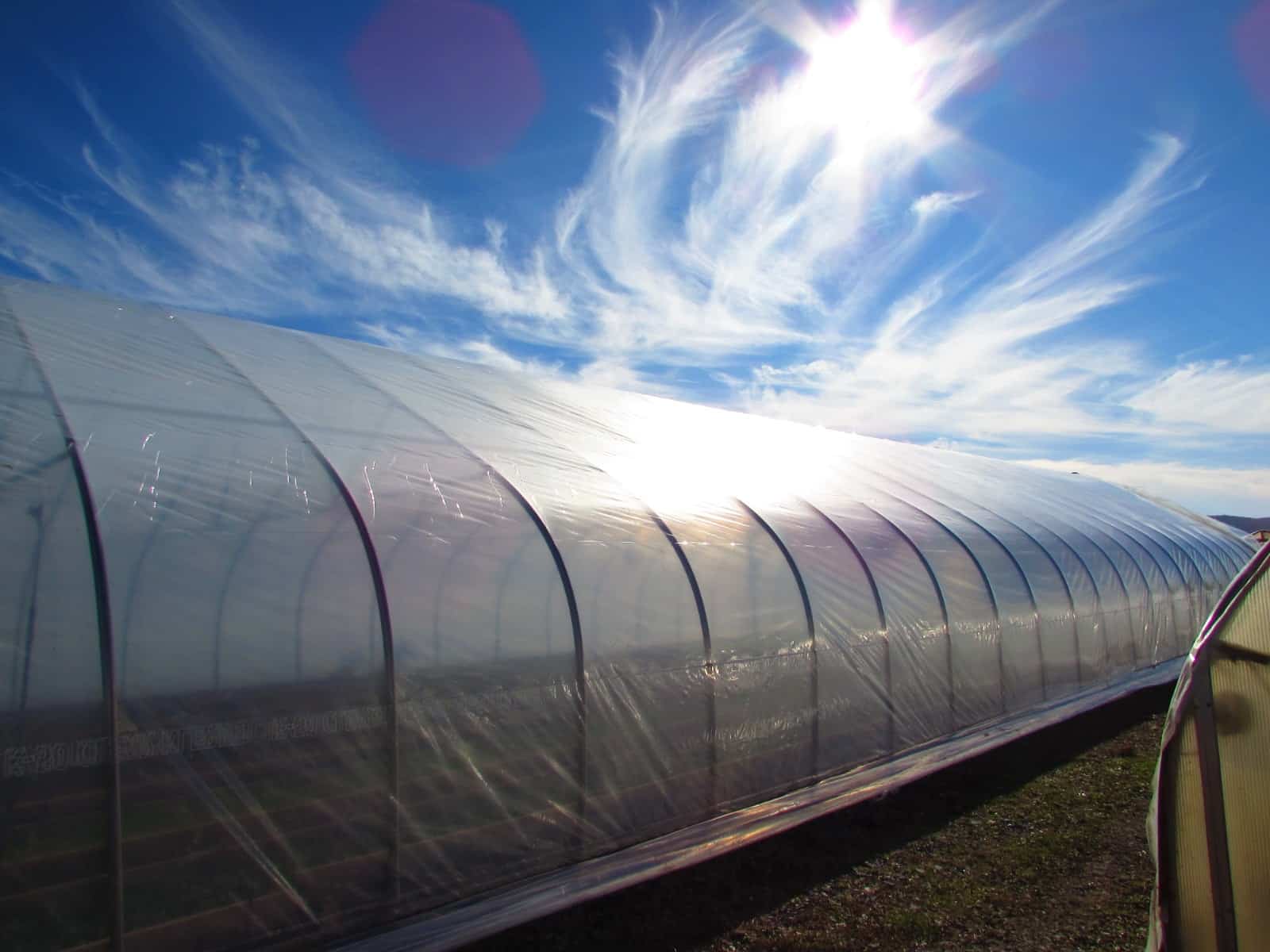
What’s the story behind your farm’s name?
Agustin basically left the name up to me. So, I came to him with a name or two, but they didn’t feel right. Several friends and I were on a short road trip and the conversation about the farm’s name came up. I told them I wanted it to have some Hispanic roots to represent Agustin, and something to represent the earth part of it. So many names and laughs were shared and we landed on Chicano, because our boys are Chicano, with one Mexican and one American parent. We had the farm just a short time before the boys were born, and it was our first love and accomplishment together. Sol, which means sun in Spanish, is because everything on a farm needs the sun, from the plants to the farmer. And so, Chicano Sol it was.
How large is the farm? What does it look like? Have you expand it at all since the beginning?
The home farm is 7 acres, but only about 3 tillable in fields. In addition to the greenhouses, we have two high tunnels. We rented three acres from a neighbor after his previous tenant, also certified organic, retired. The most recent addition was 10 acres from our neighbors just across the road from the home farm.
For now, buying land isn’t in the cards, and renting is hard sometimes. Fortunately, the ground we rent currently is in great relationship with some pretty amazing landowners. But adding another rental area increases time spent back and forth with things and we have enough of that for now. Labor is another issue of course.
Why did you decide to become certified organic?
It is how Agustin’s parents farmed, how my parents gardened and what we knew from Spiral Path. And we care about the earth, and want to do what we can to make it better for future generations. Hopefully, we can leave our piece of it a little better than we found it. It requires perhaps a little more attention and record keeping, doesn’t all farming nowadays? But again, we don’t know anything different!
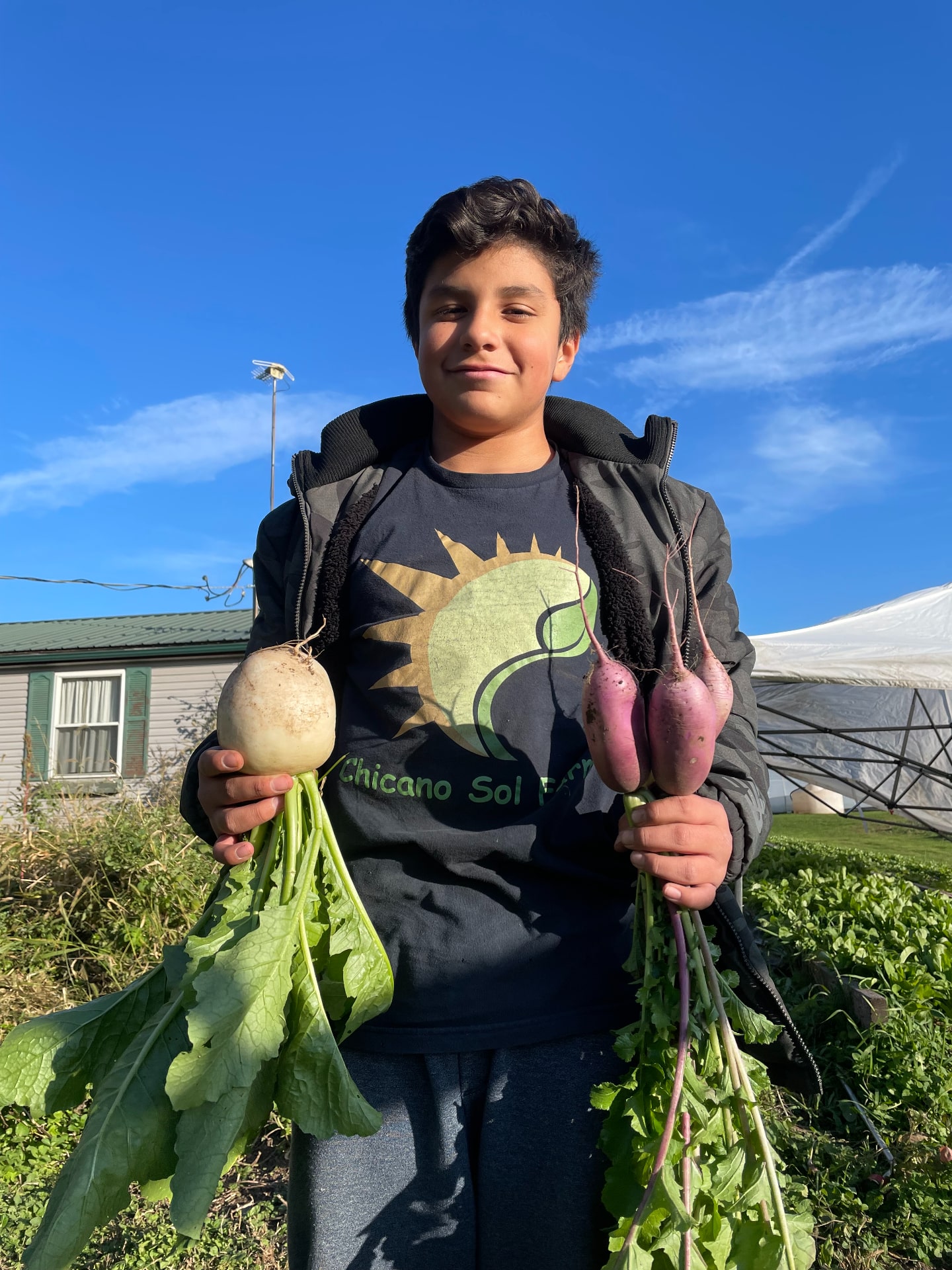
Jarrah and Augustin’s son, Evin
How have you connected with the agricultural community in your area? Are there any other leaders or mentors who’ve helped you along the way?
Of course, we gained a wealth of knowledge about farming, sales and life in general from our previous employers, Mike and Terra Brownback. Agustin was away from his parents, seeing them rarely. My dad passed away in 2007, and and Mike definitely filled in some gaps for both of us. We both have a lot of respect for him.
Jonas and Judy Stoltzfus, founded and owned JuJo Acres, a certified organic beef farm just down the road from us. Jonas has since passed away, but he was always there for us when we started out, lending and fixing machinery. He would always ask if we were paying our mortgage from the farm yet, and not from our savings or outside jobs. I still recall his smile on the day when I could legitimately say “yes” to his inquiry. I think he was as happy for us as we were for ourselves. I don’t think at that age, and early on in our farming lives, we really grasped how hard financially speaking farming can be, especially small scale and first- generation.
There are also countless farmers we have met via the PASA community and from the Tuscarora Organic Growers Cooperative, the local growers coop we’re a part of. Every farmer I have ever known has left something with me I could use at some point along this journey.
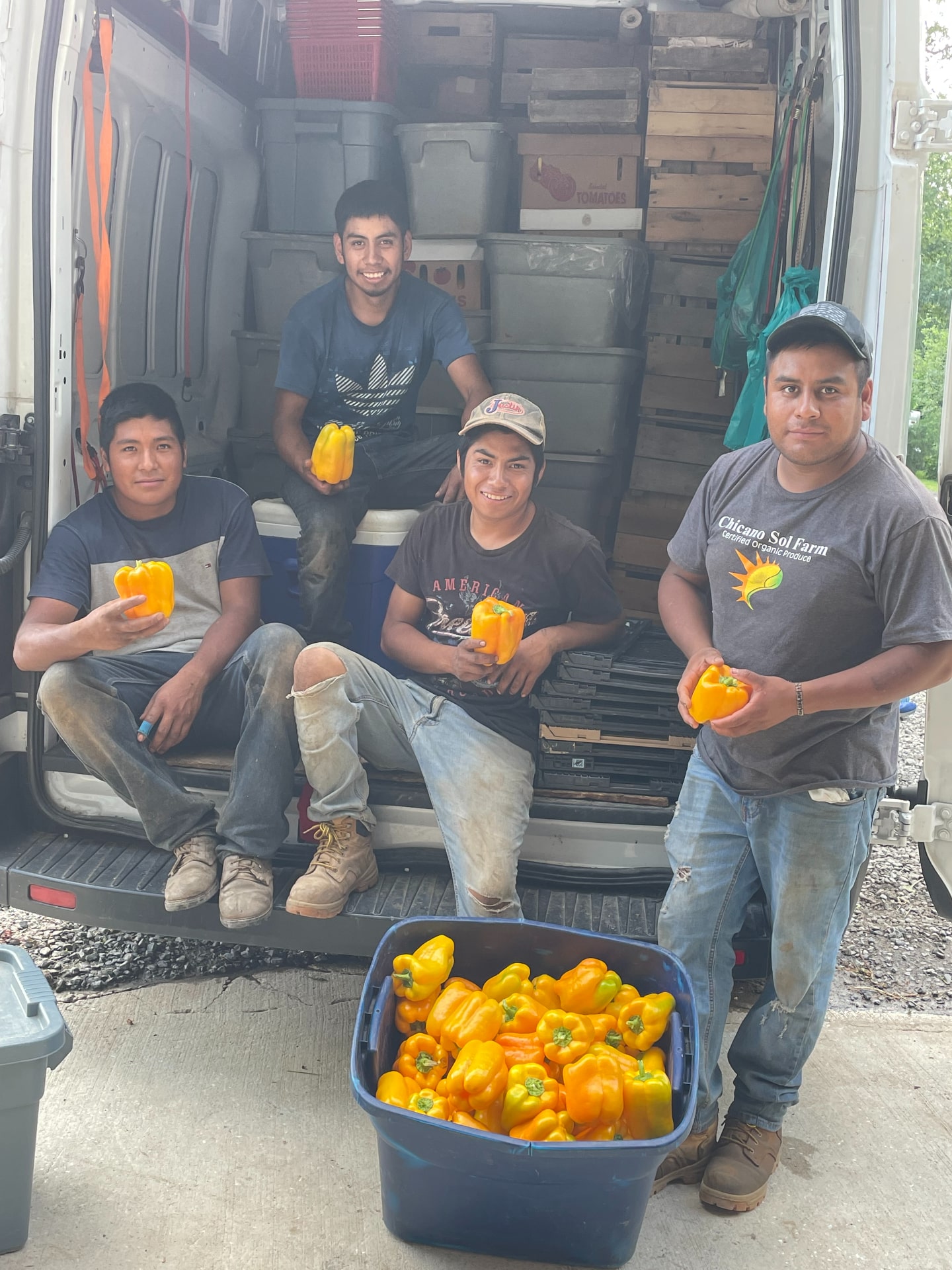
What are some of the challenges you’ve faced? What about some of the victories?
We are first generation. And while I can’t say second-generation, third or beyond makes farming any easier, I can only speak from our experience. Everything Agustin and I have, we worked and sweated for. We had a small savings when we first started out, but nothing compared to what it takes to be comfortable farming. We made do along the way and acquired better tools and implements when we could afford to do so. Most of our equipment is used, found at auctions and sale ads.
If Agustin is one thing, it is resourceful. Like this winter for example, we purchased an Allis Chalmers G [a small implement carrier tractor]. We have wanted one since we started farming, but other things added more value and sometimes, it’s about compromise. Anyway, we found one from one of our fellow late coop members. It wasn’t running, the gas tank was rusted and it needed a lot of love. Agustin and our boys, Austin, age 13 and Evin, age 10 and myself worked, watched YouTube, read manuals, and celebrated the Sunday evening the tractor finally turned over all the way. We work together as a family, and really it always all works out in the end.
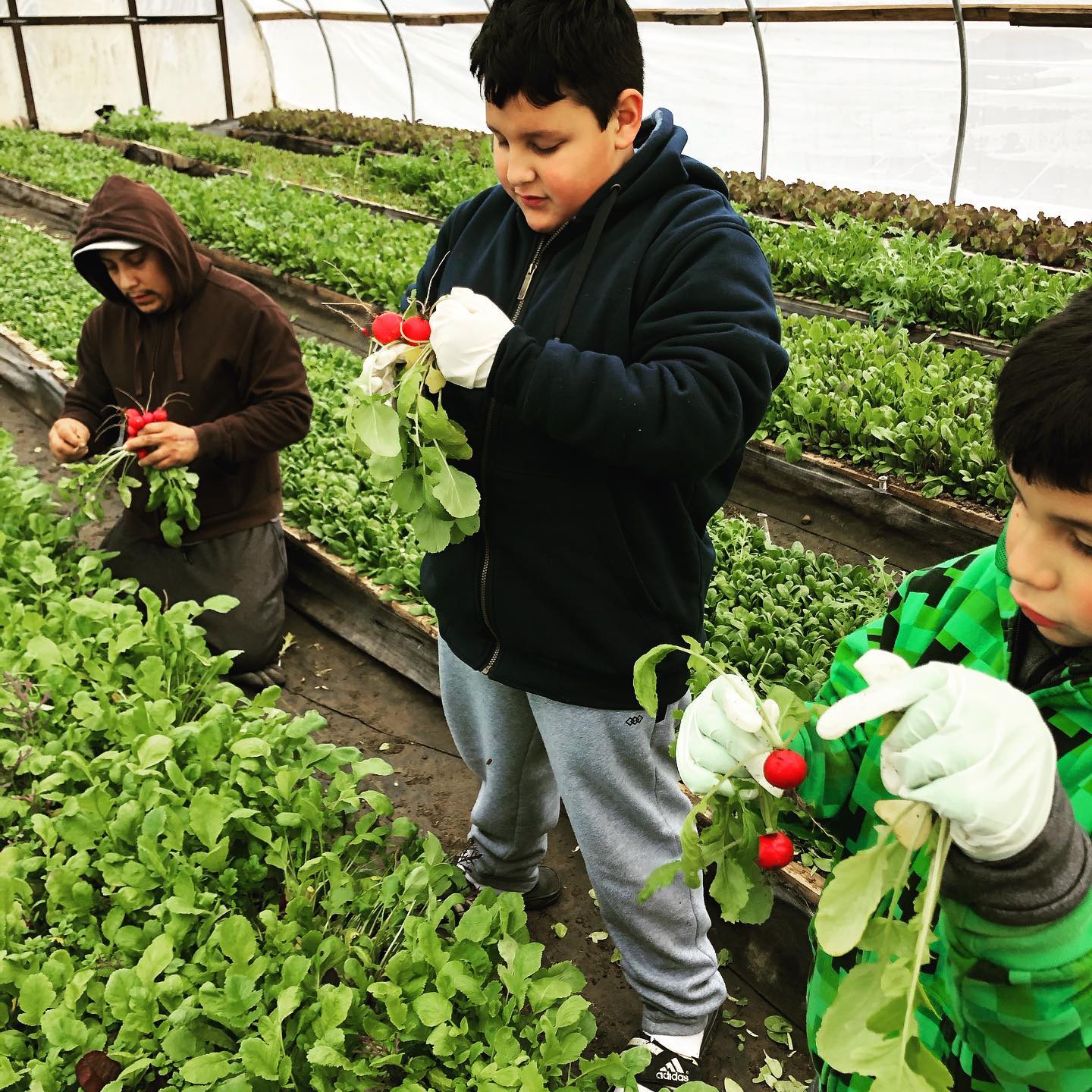
Augustin with his sons
Tell us about your CSA model and farmers markets! Is this the best way for people to support you and enjoy your vegetables?
We have a farm stand in Garrett Park, Maryland. It’s a great community that shows up to support the farm every week, no matter the weather. We work with numerous other small farms, orchards, apiaries and gather as much as possible to make the stand a one stop shop. Anything from our produce to meat, eggs, breads, baked goods, coffee, milk and more sold here.
And we sell at Freshfarm Market’s Dupont Circle market, which is a producer-only market. We have been in a handful of other markets, the last of which ended due to staffing issues and time constraints from Covid. Sanitizing and cleaning increased between markets and we just didn’t have the staff or infrastructure to make anymore markets work. Since Covid, the two markets we do have had an increase in sales to some extent, which helped alleviate losing our third market. Both are open air, and I feel like people really appreciated that during the uncertainty of the pandemic. The market was an outing people could still attend, it gave them a feeling of normality during those unknown days where our world turned upside down, and no one knew when or if we would ever return to “normal.”
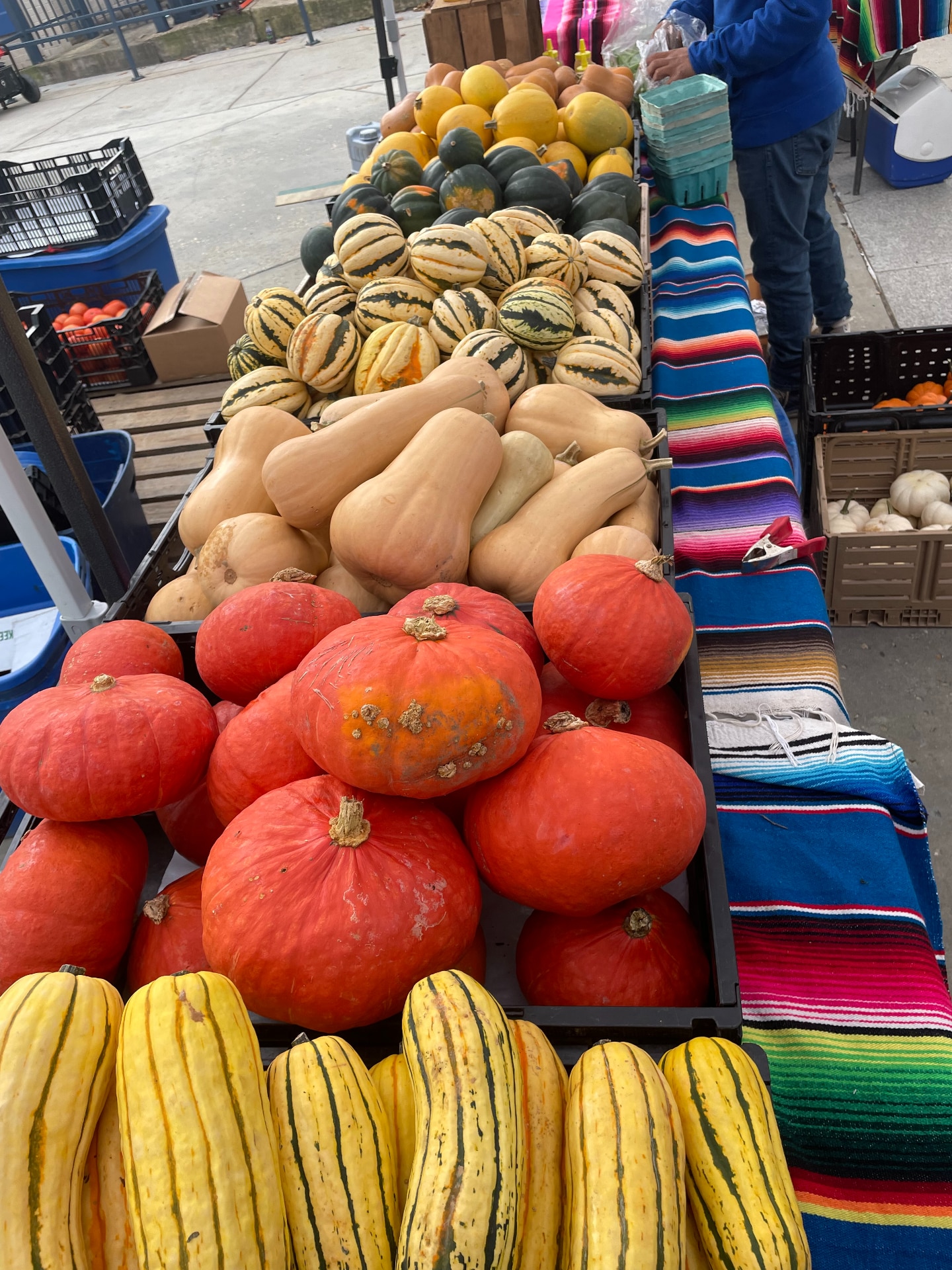
Both markets provide us the opportunity to put real, whole food directly into the hands of our customers. We feel like we are part of both the communities in which we sell. We are watching families form and babies grow, some of which now work at the market with us! We also offer a traditional-style, farmer’s choice CSA, which is another direct-to-consumer relationship. The CSA family of course is very helpful to us in the spring, and we appreciate to the fullest anyone willing to make that commitment to us and our farm!
We also work with another local coop, Lancaster Farm Fresh, which helps us out selling a few crops at the wholesale level. They are a little farther away and we aren’t actual members there like we were at Tuscarora, however, they treat us well, and are yet another “family” we have found in farming.
To learn more about Chicano Sol Farm or to sign up for a CSA, visit its website. For a peek of life on the farm, follow along on Instagram and Facebook!
- Photos: Chicano Sol Farm
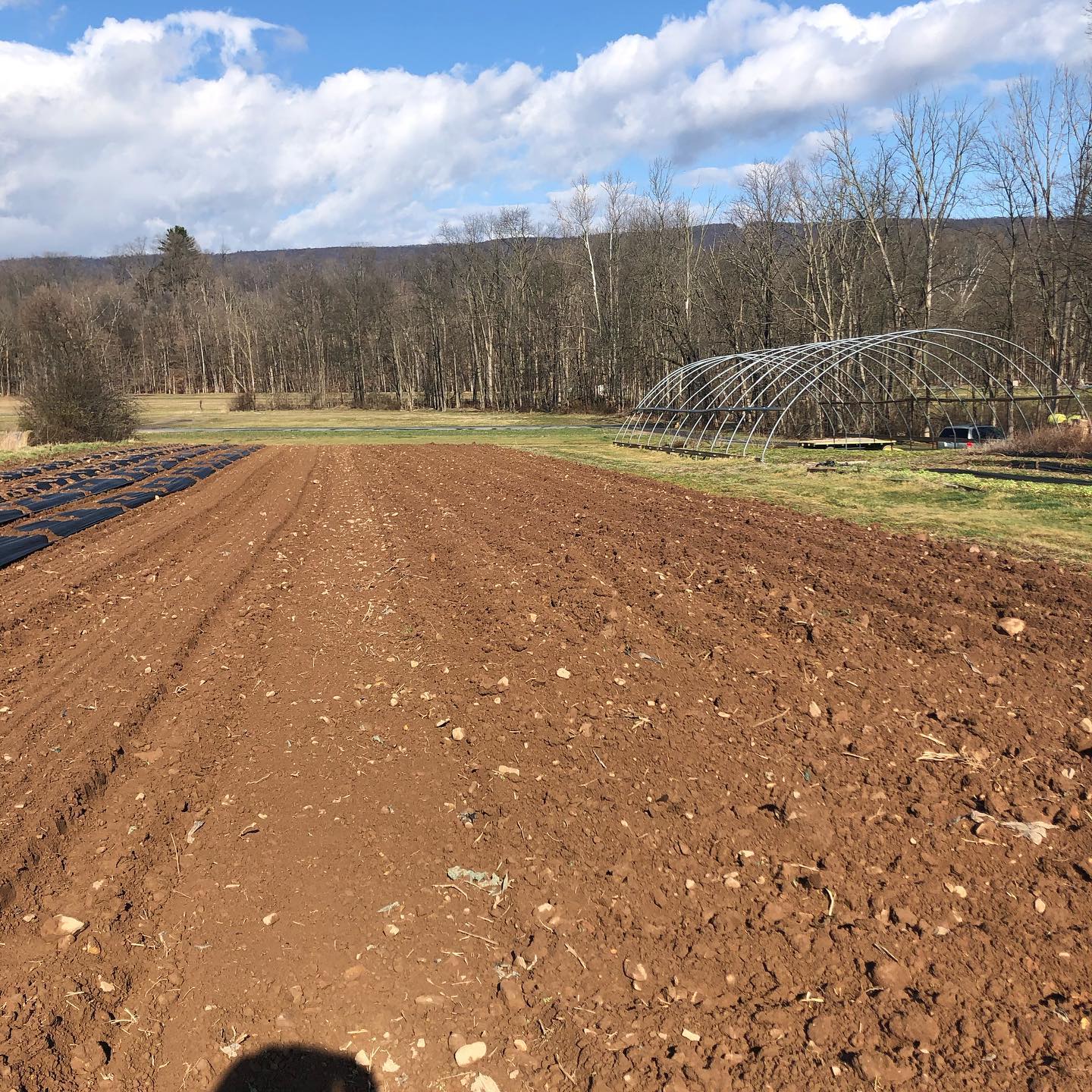
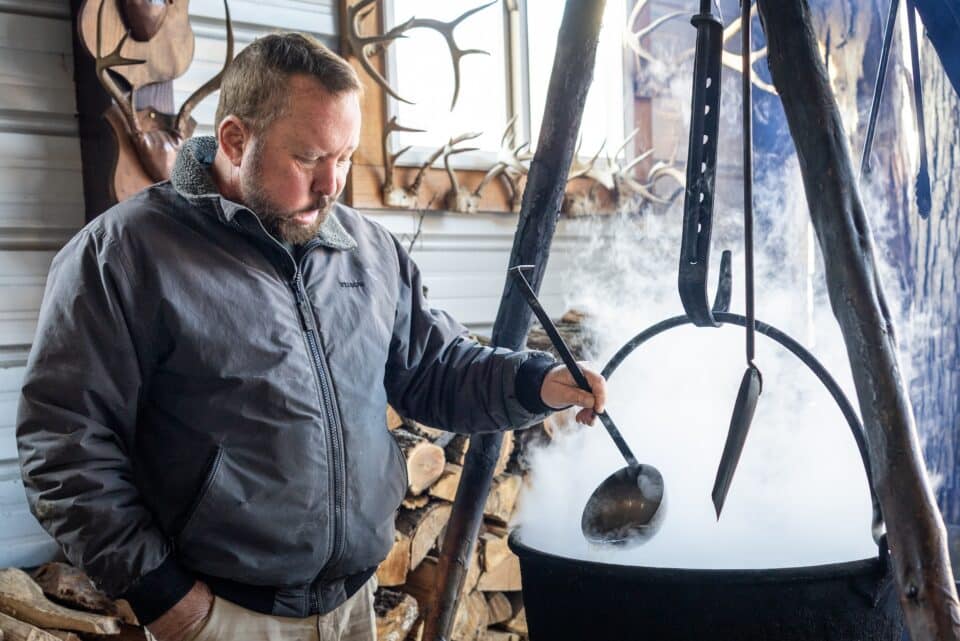
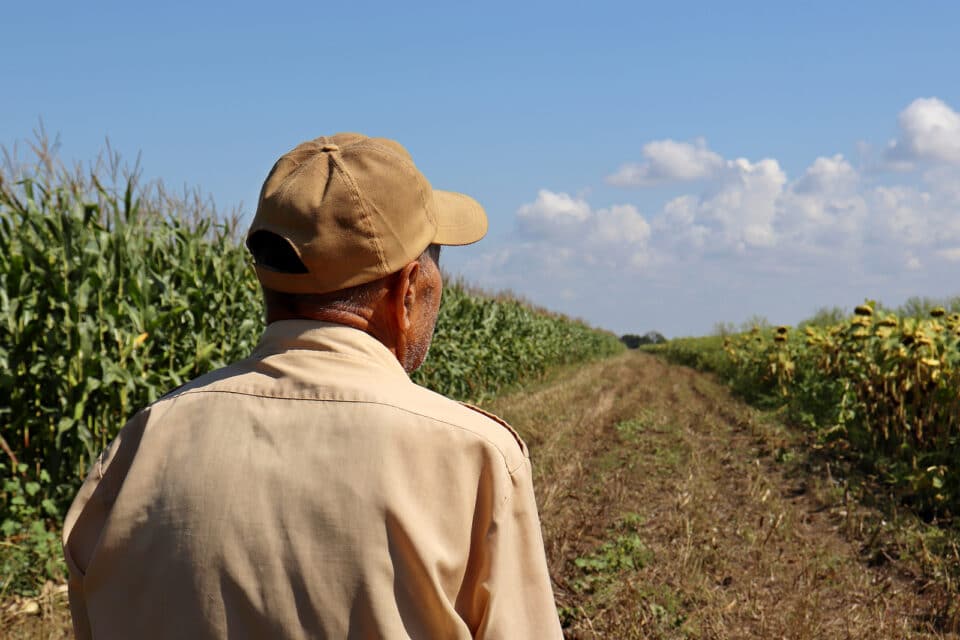
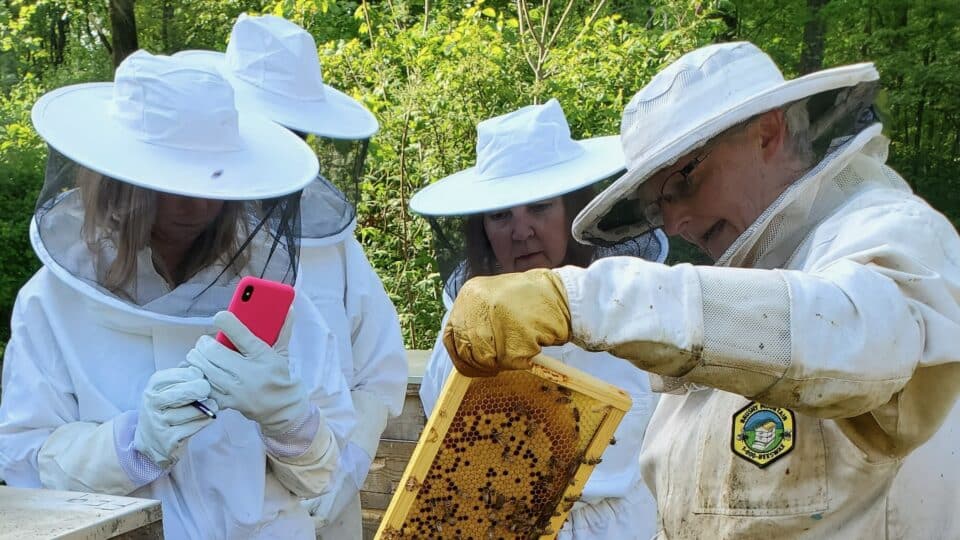
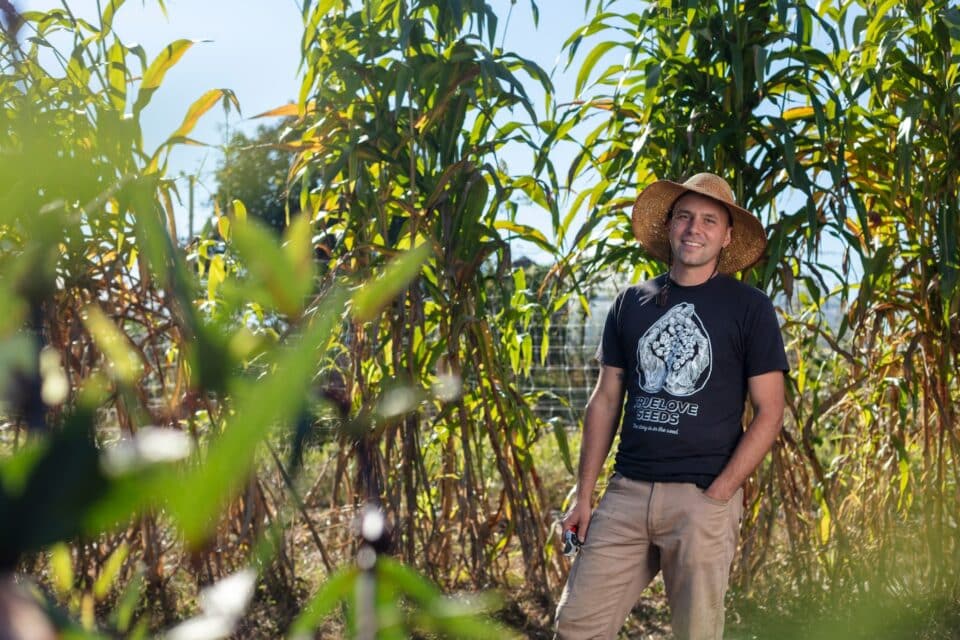

2 Comments